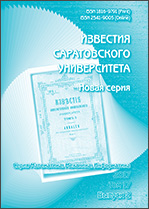|
Scientific Part
Computer Sciences
The key exchange protocol based on non-commutative elements of Clifford algebra
S. N. Chukanov
Sobolev Institute of Mathematics, Siberian Branch of the Russian Academy of Sciences, Omsk Branch, 13 Pevtsova St., Omsk 644043, Russia
Abstract:
Many of the asymmetric cryptography protocols are based on operations performed on commutative algebraic structures, which are vulnerable to quantum attacks. The development of algorithms in non-commutative structures makes it possible to strengthen these protocols. Cryptography is a branch of mathematics that solves the problem of transmitting information through unsafe channels. For this, information is encrypted, so it cannot be used without first decrypting it. In encrypted communication, subtasks are distinguished: secure key exchange, and then encryption/decryption of the message. Public key cryptography uses the Diffie – Hellman key exchange protocol. Since the beginning of this century, interest has increased in the development of alternative asymmetric cryptosystems that are resistant to attacks by quantum computer algorithms. Most of these schemes are non-commutative cryptography algorithms, such as a scheme of matrix polynomial ring. One of the tasks for the development of cryptographic schemes — the task of conjugacy search, can be formulated over finite non-commutative groups. The security of information transmission can be built based on the undecidability of the conjugacy search problem, which is defined over finite non-commutative groups. The aim of this work is to develop a model of the Diffie – Hellman protocol using the algebraic structure of the Clifford algebra (which includes the quaternions) and the structures of the polynomial ring. Safety ensuring of the algorithm using Clifford algebras is based on the non-commutative structure of these algebras and the ability to work in a space of any dimension $n \ge 1 $. Clifford algebra groups are non-commutative structures, as are matrix polynomials and braid groups. However, Clifford algebra groups are more compact and show shorter execution times in many comparable operations. The use of elements of Clifford algebras and exponents of integers as coefficients allows us to reduce the requirement for processor registers (do not use floating-point processors) and significantly increase the performance of forming the Diffie – Hellman protocol.
Key words:
non-commutative cryptography, quaternions, octonions, Clifford algebra.
Received: 18.07.2020
Accepted: 03.05.2021
Citation:
S. N. Chukanov, “The key exchange protocol based on non-commutative elements of Clifford algebra”, Izv. Saratov Univ. Math. Mech. Inform., 21:3 (2021), 408–418
Linking options:
https://www.mathnet.ru/eng/isu906 https://www.mathnet.ru/eng/isu/v21/i3/p408
|

|




 Contact us:
Contact us: Terms of Use
Terms of Use
 Registration to the website
Registration to the website Logotypes
Logotypes







 Citation in format
Citation in format 